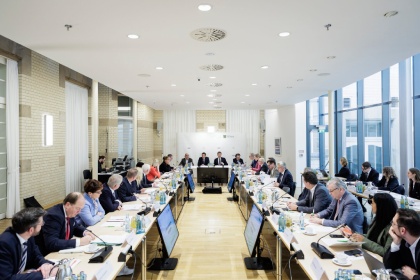Germany’s electric arc furnace (EAF) steelmakers are intensifying calls for political action as electricity costs, global import pressures and scrap availability concerns increasingly threaten their competitiveness. A high-level meeting hosted by the German Steel Federation (WV Stahl) brought together medium-sized member companies, metalworkers’ union IG Metall and senior industry representatives, with the purpose to assess current challenges to the electric steel route and review progress on commitments made at the Chancellor’s Steel Summit on November 6, 2025.
WV Stahl president Gunnar Groebler underscored that electric steel plants form the backbone of the circular economy and are central to Germany’s decarbonization strategy. He warned that uncompetitive electricity prices, weakened demand and rising import pressure are undermining the sector. Without decisive political action, he said, investment plans, production sites and tens of thousands of jobs remain at risk.

EAF steelmaking’s role in Germany’s industrial base
Electric steel production currently accounts for around 30 percent of Germany’s total steel output and supports approximately 32,000 direct jobs. Maintaining this contribution requires substantial investment in new technologies to meet climate goals. However, producers are simultaneously facing high electricity and grid fees, low production levels, uncertain access to high-quality scrap and intensifying global import competition driven by excess capacity abroad.
These overlapping pressures have created a structural cost disadvantage, particularly for EAF mills reliant on electricity as their primary energy source.
Call for competitive industrial electricity prices
A central demand from the industry concerns securing internationally competitive industrial electricity prices. EAF producers emphasized that an all-inclusive price between €30 and €60 per MWh, covering grid fees, taxes and levies, is necessary to remain competitive.
Although companies welcomed the expected reduction in transmission grid fees, they stress that long-term stability is essential. Industry leaders also advocated for deeper carbon electricity price compensation and a revision of the EU state aid framework, ensuring electricity price measures apply to all consumption volumes and remain compatible with existing compensation mechanisms.
Stronger trade measures and effective CBAM implementation
Trade policy emerged as another key area requiring government action. The industry argues that stronger EU trade instruments are needed to counter intensified import pressure. They stressed the importance of closing loopholes within the Carbon Border Adjustment Mechanism (CBAM), introducing an export solution for steelmakers, extending CBAM protection to steel-intensive downstream products and ensuring the establishment of fair CBAM benchmarks.
Until these gaps are resolved, companies insisted that continued free allocation remains essential to safeguard competitiveness against carbon-intensive imports.
Ensuring long-term scrap supply security
Scrap availability and quality were highlighted as strategic issues for the future of EAF-based steelmaking. Producers called for stricter monitoring of European scrap flows and consistent enforcement of EU regulations. They also underlined the need to revise the End-of-Life Vehicles Directive and formally designate steel scrap as a strategic secondary raw material, given its critical importance for Germany’s expanding EAF production.
Strengthening domestic production and creating lead markets for green steel
Industry stakeholders emphasized the need to strengthen domestic steel production and support lead markets for green steel. They argued that EU preference schemes and sustainability criteria integrated into public procurement could enhance industrial resilience and accelerate the adoption of low-emission steel products across European supply chains.
Lastly, the report highlighted that the EAF route already avoids around 10 million mt of carbon dioxide each year and recycles more than 10 million mt of steel scrap.